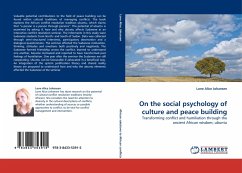
A social construction of gender in the future profession of psychology
Versandkostenfrei!
Versandfertig in 6-10 Tagen
30,99 €
inkl. MwSt.

PAYBACK Punkte
15 °P sammeln!
In this qualitative study I explored how postgraduate psychology students treat gender in their accounts of their future profession, using a social constructionist framework. I considered how this group of future psychologists drew upon gendered accounts in three different settings in which they found themselves within the profession. These different settings included exploring how participants constructed their own gendered identities in their narratives of how they came to be pursuing professional training in psychology; how gender featured in their accounts of therapeutic processes and inte...
In this qualitative study I explored how postgraduate psychology students treat gender in their accounts of their future profession, using a social constructionist framework. I considered how this group of future psychologists drew upon gendered accounts in three different settings in which they found themselves within the profession. These different settings included exploring how participants constructed their own gendered identities in their narratives of how they came to be pursuing professional training in psychology; how gender featured in their accounts of therapeutic processes and interactions with clients; and finally, their reflections on gendered participation in the broader field of psychology. This study intended to contribute to the expansion of existing literature by addressing the issue of gender and its related aspects in the field of psychology in a South African context, given the dearth of extended research conducted in developing countries so far. The findings supported those of previous studies to an extent, but mainly redressed the perspective of gender through the identification of new themes.












